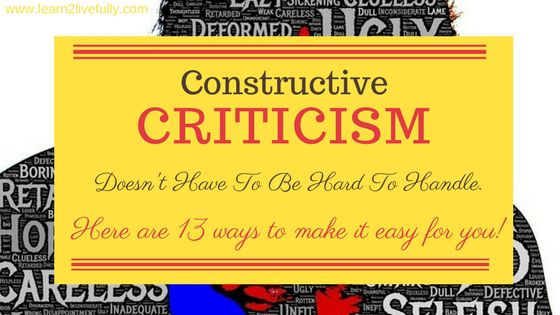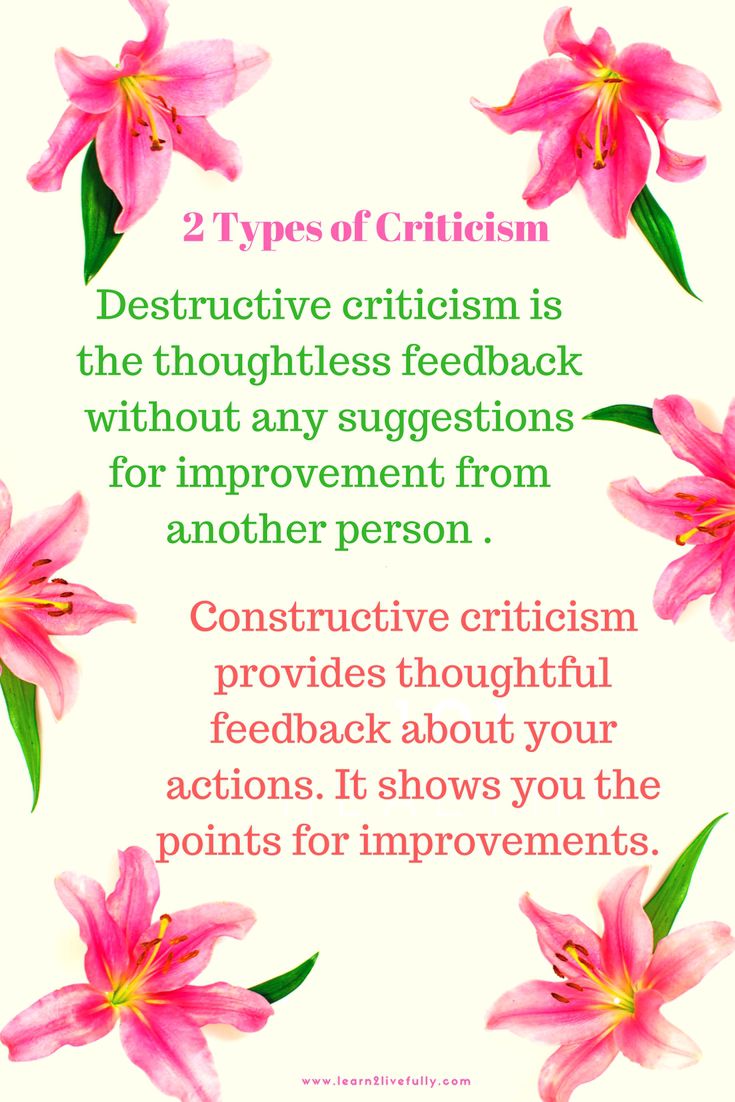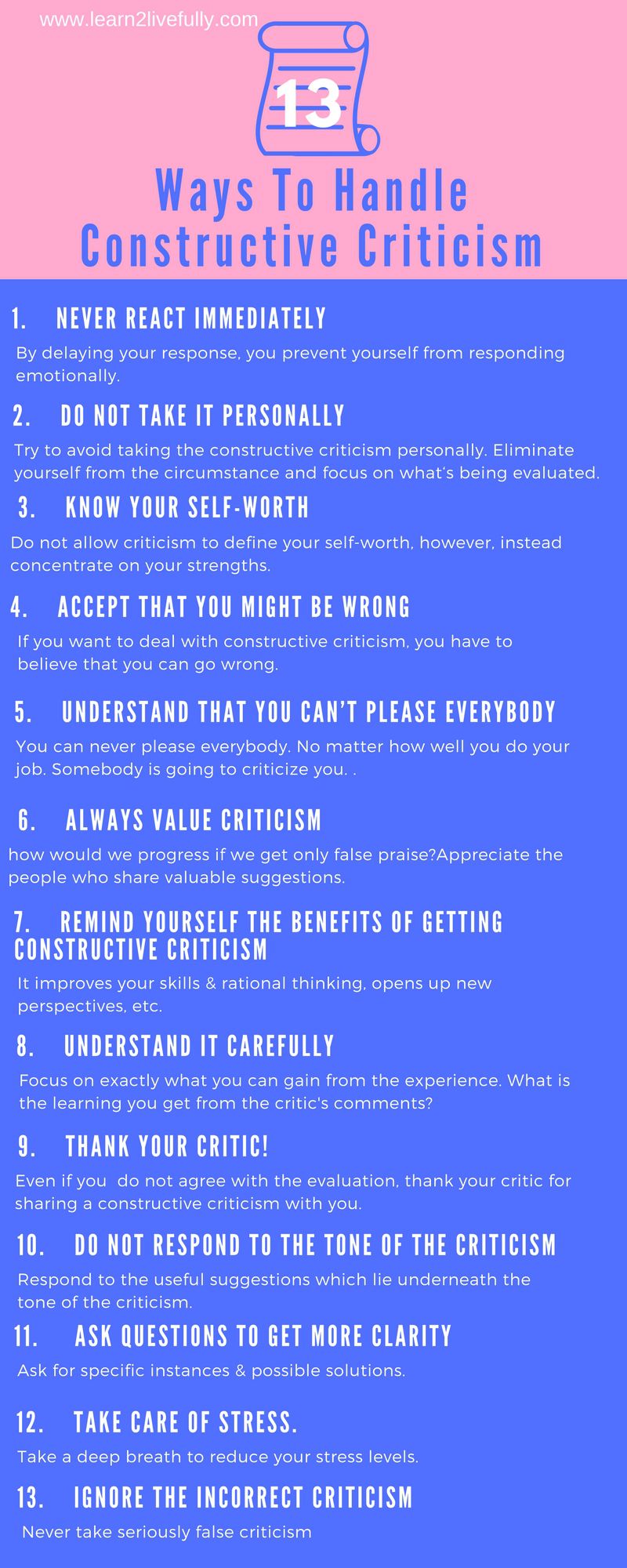Constructive Criticism Doesn’t Have To Be Hard To Handle. Here are 13 ways to make it easy for you!

Whatever you do in this world — whether you own a business or work in a multi-national company; decide to quit an unsatisfying job or work your butt off; choose to stay single or married; opt to have kids or not to have kids; — somebody is going to criticize you. Nobody likes Criticism. Unfortunately, it is unavoidable in today’s world. Many times, criticism does help you to grow if you handle it efficiently; even though it hurts! Learning to deal with constructive criticism is a significant step towards your success.

I grew up with the belief that if we perform our responsibilities with integrity, persistence, and quality, we will be appreciated.But over a decade of corporate work experience with different multi-national companies taught me good work is never met exclusively with applause.
In our professional lives, a far more likely reaction to a good work is a polarized one. No matter how well you perform, some people are going to criticize you. It can come from your superior or a team member.
Have a look at below presentation on Let go of Control to know about the important points covered in this post.
Keep Reading…
Criticism is part of our lives because everybody has an opinion, some are jealous of you, some want to drag you down, and some want to help you. Criticism does hurt! When somebody verbally lashes out at you, it feels as if you are under attack. You will certainly never have the ability to silence each of your doubters, so it is better you develop a strategy to handle criticism.
[bctt tweet=” “To avoid criticism, do nothing, say nothing, and be nothing.” -Elbert Hubbard” username=”Learn2LiveFully”]
Before looking into criticism in detail, I want you to ask yourself the below question:
Who is your Biggest Critic?

Is your biggest critic the person, you see every day in the mirror? We can complain about the criticism from outside. But constant self-criticism makes it difficult for you to handle criticism from others.
Perfectionism and inner fears about outside criticism can stop you from progressing on your aims. Outside critics complain and move on. But the self-critic in you follows you.
You may read on why you feel not good enough and why you lack self-confidence.
You can use criticism to improve yourself or lower your self-esteem and create stress or anger. We have no control over other people’s opinions, but we have full control over how we respond to criticism.
Everybody is qualified to their point of view, right? However are you qualified to hear their opinion? To be sincere, many of us only intend to listen to exactly how best we are, not exactly what we are doing wrong.
Before looking into how to handle constructive criticism. Let’s understand criticism better.
[bctt tweet=”Criticism is the practice of judging the qualities and faults of something or someone.” username=”Learn2LiveFully”]
Criticism can be categorized as constructive criticism and destructive criticism.


Destructive criticism is the thoughtless feedback from another person. It can involve name-calling, hurtful comments pointing out your errors without any suggestions for improvement.
Constructive criticism provides thoughtful feedback about your actions. It shows you the points for improvements. Constructive criticism is meant to help you whereas negative feedback is to hurt you.
To become comfortable with any criticism, you should first identify if it is a valuable feedback or not.
Hold for a moment and ask yourself below questions when you hear a criticism:
- Is this feedback irrational or helpful?
- Does it have only hurtful comments pointing out your mistake?
- What is the tone of your critic’s voice?
- Are you in a good relationship with the critic?
You can ignore the negative and baseless feedbacks, boost your self-esteem and be comfortable with yourself.
We are what we are because of our habits. You may like to read the articles on habit building here.
How to handle constructive criticism?
Prepare yourself to better handle criticism.

1. Never react immediately

When you hear criticism, your first instinct will be to respond quickly. You might have a tendency to defend yourself. Stop! At the very sign of criticism itself, you stop reacting to it at all! By delaying your response, you prevent yourself from responding emotionally.
Have you got a critical email? Do not respond immediately. Give yourself at least an hour before your reply. Delaying the response will help you respond calmly and avoid responses you may regret later.
If you find it hard to respond graciously, stay silent.
[bctt tweet=”Silence is a far better weapon than defensiveness or anger.” username=”Learn2LiveFully”]2. Do not take it personally

Try to avoid taking the constructive criticism personally. Eliminate yourself from the circumstance and focus on what‘s being evaluated. When your colleague says you are ignoring his opinions in meetings, look at it as a suggestion to improve your team management skills.
Do you feel personally offended, when your wife criticizes your cooking? Do not feel it as she is criticizing you, but a trait of yourself.
3. Know your self-worth.

Do not allow criticism to define your self-worth, however, instead concentrate on your strengths. You are a unique individual, and at times uniqueness is slammed since it is an undiscovered region. Your new way of completing a task may have been met with criticism initially only to be appreciated later as others realize your vision.
4. Accept that you might be wrong

It would be wonderful if we were always right and always had the best way of doing every little thing. It’s ok not to be right frequently! Nobody is perfect. Everybody has some defects. If you can’t find any faults in yourself, it probably could be because you are not analyzing yourself.
If you want to deal with constructive criticism, you have to believe that you can go wrong. Once you have identified the criticism as a constructive one, no matter how harsh is your critic, admit that you have something to improve.
5. Understand that you can’t please everybody

You can never please everybody. No matter how well you do your job. Somebody is going to criticize you.
Do you think your coffee is the best? Have you got appreciation from all your friends? But your father in law could complain about your coffee.
6. Always value Criticism

Everybody likes praise. When people share appreciation, we feel happy. But when they criticize us, we feel dejected.
Tell me, how would we progress if we get only false praise? How would we ever know what to improve?
If a criticism is valid, lend all ears and attempt to pick up from it instead of being defensive. Appreciate the people who share valuable suggestions.
7. Remind yourself the benefits of getting constructive criticism

Constructive Criticism:
- Boosts your humility as it enables you to look at your weaknesses.
- Gives you an opportunity for you to improve your skills, deliverables, and relationships.
- Opens you up to new perspectives
- Improves your rational thinking
- Provides you an opportunity to choose peace over conflict
8. Understand it carefully

When a person provides feedback to you, listen carefully. Allow the critic to complete his or her thoughts. Repeat back what you understood. It is not an easy task to give feedback to anyone. Do not scrutinize or question the person’s evaluation; instead, just focus on understanding his or her comments and perspective.
Focus on exactly what you can gain from experience. What is the learning you get from the critic’s comments? Most criticism has some truths in it even though it is hurtful. So utilize the opportunity and learn from his or her suggestions.
9. Thank your Critic!

Thank your critic for sharing a constructive criticism with you. Appreciate the fact that the person has taken the time to talk to you something that can make you an even better person.
Expressing thankfulness doesn’t have to mean you agree with the evaluation, but it does show that you’re acknowledging the effort your critic took to evaluate you and share his or her thoughts.
10. Do not respond to the tone of the criticism

You need to distinct the criticism from the style of criticism. Some people make valuable critical suggestions but in a tone of anger.
Always respond to the useful suggestions which lie underneath the tone of the criticism.
11. Ask questions to get more clarity

Respond calmly with questions to get to the root of the problem. Break down the feedback to understand what to do next. You can share your perspective. Ask for specific instances that help you understand the problem. You can request possible solutions to the problem raised.
12. Take care of stress

When we’re often on edge, we could feel out of control and unable to respond to criticism with a clear head. So take a deep breath to reduce your stress levels.
13. Ignore the incorrect criticism

Do you think the critic is critical by nature? He or she is critical of everything! Never take seriously such criticism. Some people may not be realizing they are hurting other people by false criticism. If you take seriously such comments, you will build anger and resentment towards the criticizer. So simply ignore false criticism!
Keep in mind that the criticism represents merely one person’s point of view. Know what your strengths are and do not allow other people’s opinions stop you from working persistently to an objective.
“Criticism may not be agreeable, but it is necessary. It fulfills the same function as pain in the human body. It calls attention to an unhealthy state of things.”
– Winston Churchill
Needless to say that you need to incorporate the learnings from constructive criticism in your life. Even you can check back with the critic to make certain the changes are adequate.
How do you handle criticism? Did you find these tips helpful? Please do share your thoughts as comments.





Comments
This is a very well thought out and insightful.article.Constructive feedback us gold.It’s the best way to grow Love the care either which you wrote this. I will be using these tips .
YES! love this article, all the pointers and tips you gave are spot on!! One of the most important ones you mentioned is to never take it personal.. Constructive criticism helps us learn and grow! (when it is done professionally and politely). Great post!!
LOVE THIS! What an enlightening, and inspiring article. You really covered everything here too. Love the infographic! A great reminder for all but even more so for us over achievers! Thank you!
This is an excellent read. I have always tried to incorporate these tips. And not take the criticism personal. However, there was one occasion where I felt a past boss had nothing positive to say but only found fault. So I am glad you provided clarity . I find I am my biggest critic. So I will search for ways to improve.
I agree with this post, and I think it is always about how the criticism is given. Sometimes the content or the words being said is true and helpful, but the delivery is what makes people take the words with offense.
I agree with what you criticism is good. But sometimes the way people tell I to read is harsh so alot of people take it personal. Great post.
This is very well put together. Sometimes people really don’t know how to give critic on a good way so you can grow from it. Thank you for putting this together. It was a good read.
Great tips these! I am terribly sensitive and have never really coped very well with criticism. I need to learn how to do some of these strategies.
Feedback can be received well if you have an open mind. It should not cause a person to break or to be hurt when it is unintended. It should help to enhance a person if it is applied.
Such a thoughful post on criticism and its different aspects. I totally agree, in my case I am my own biggest critic. And also to the fact that no matter what there will always be critics
This is such a great article! The first things I do are react and take it personally. Shesh. I normally get so defensive. This is something I definitely need to work on.
That was a nice reading. I agree on everything you wrote. Personally i don’t take critict very well, but everythig depends also on the way the critic is given…
Being able to receive constructive criticism as well as give it effectively are definitely a learning process. It’s so important for us to do so in order to grow personally and professionally.
It’s super important to learn to not take it personally. Take whats good and ignore the rest if ti’s not helpful.
Criticism, no matter how thoughtfully it is delivered, can be difficult to take. This list is very helpful in showing how to handle that.
Excellent post. In my opinion, its always best to look out for constructive criticism as these are the things which will help you grow and be better than before. We should always take notes on how we can better ourselves rather than taking everything personally.
It’s hard to not take criticisms personally, especially if people don’t appreciate the good things you’ve done. Instead they focus on the things you did wrong. Nevertheless, I should really be confident with myself and think positive.
I know that criticism can be very hard to take. And it’s so easily to take everything that is said personally. I also think it’s important to learn from constructive criticism. My only issue here is that sometimes something that poses as constructive is actually destructive. Because criticism, even if it comes with a way to improve, can be destructive when it’s subtle purpose is to harm the other. And that can be inferred from tone. Sometimes the tone of the criticism can tell as much about he criticism as what is being said.
Great points you have here! But we must have an open mind and heart that not everyone can take any kind of criticism. Just refrain of giving one to artists.
Constructive criticism can be productive as long as one doesn’t take it personally and has an open mind. Constructive criticism helps us grow individually. It is a form of feedback.
I used to struggle so much with constructive criticism- feeling like it was an attack. Now I realize how important it is for growth!
This is great. There is great value in constructive criticism. As long as it isn’t destructive, we should take it into account.
I think being able to handle constructive criticism is very important. It can help us learn and grow in our careers.
Great tips. It’s so hard not to take things personally but there is always something positive you can gain from a negative, right?
Yes yes yes and yes! I agree with all of this! This is such a great article full of great quotes and wisdom. But sometimes it’s hard to take criticism (even constructuve one) the way we’re supposed to 🙂
Excellent list. As much as I want to say I can take constructive criticism, I too fall short like most.
I guess we realy need to prepare ourselves to accept various criticisms. Its our attitude towards it that will help us accept and learn from those. This post I must say is a nice one.
Constructive Criticism is so important. It helps us grow & learn.
Great read! Open minds are what what lead the future
Awesome things here. I am very happy too per your post.
Thank you so mudh and I’m takig a look ahead to contact you.
Will you please drop me a e-mail?